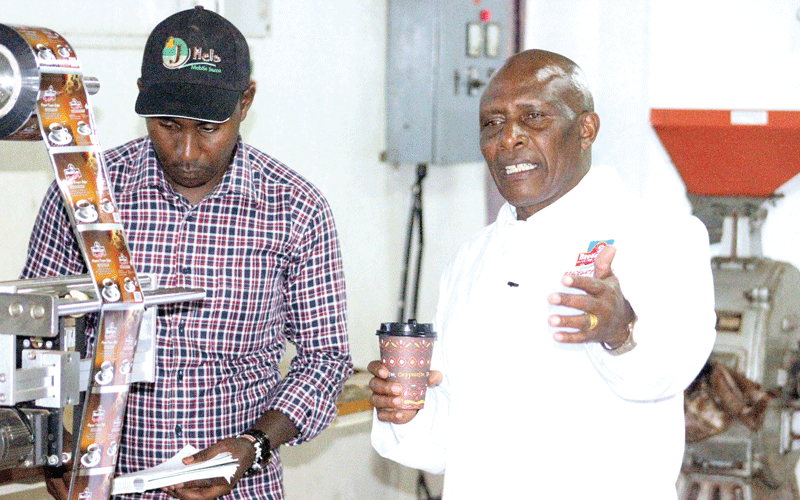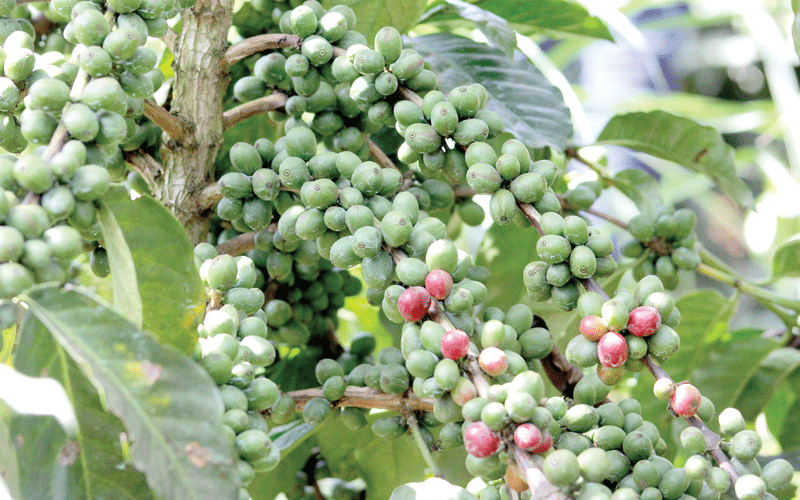How value addition will greatly boost coffee growers’ fortunes

Coffee farmers are likely to make better fortunes once international prices recover to levels last seen in the 1980s. Already, farmers who have opted to add value to the crop are laughing all the way to the bank.
A visit to various coffee farms by Agribiz around Nyeri, Kirinyaga and Tharaka Nithi counties reveals increasing optimism by coffee growers.
For instance, a Nyeri coffee farmer is earning thrice what his peers are getting for every kilo of coffee sold after milling the crop, unlike most of his fellow farmers who sell the berries raw.
Thuo Mathenge, a former clinical officer, is involved in the entire coffee value chain as opposed to production phase that has traditionally been the focus of many farmers.
So lucrative is the coffee value addition business that Mathenge has turned his farm in Marua near Kiganjo, Nyeri, to a big food processing empire.
Mathenge engages in coffee growing, roasting, packaging, brewing and marketing, trading under the brand name Brade Gate Coffee.
His cafes known as Brade Gate, are located in Nairobi, Mombasa, Nakuru, Meru, Thika, Kiambu, Karatina, and Nyeri towns. He is also a chicken farmer and bakes bread.
Mathenge sells milled coffee at Sh2,000 a kilo for exports, in local supermarkets and at the Brade Gate chain of coffee shops as opposed to the current market average price of Sh80 farmers earn per kilo of raw coffee beans. It takes about seven kilos of unprocessed coffee to produce a kilo of finely ground coffee.
“The real profit is in value addition. Why can’t we export clean coffee instead of parchment? Taking parchment to millers is a loss as the husks can be used to make briquettes,” says Mathenge.
From five acres 30 years ago, he now has 40 acres under coffee. The family owns and manages the farm and other related businesses with the help of managers.

To maintain quality and meet market demands, Mathenge practices organic farming. He has prohibited the use of chemical fertilisers on the farm and instead uses only manure from his livestock.
Near the farmhouse is the coffee processing mill, installed in 2009. He used a Sh40 million loan he acquired from a local commercial bank.
Here, sun-dried coffee beans are sorted and graded into four categories, AA, AB, B, and C and then hulled into clean coffee.(Coffee berries are called parchment after the skin is removed. After the parchment is de-husked it’s referred to as clean coffee).
The clean coffee is then roasted to different degrees and ground into fine dust to end up with two varieties; Dark Roast (100 per cent roasted) and Medium Roast (80 per cent roasted).
“To create jobs, we only imported the core parts of the roaster. The other parts were fabricated here at Nyeri Polytechnic,” said Mathenge.
The coffee is then packed into various sachets, starting from 10grammes and marketed both locally and abroad, trading as Brade Gate Coffee.
The coffee processing section employs about 10 workers depending on the season.
Like most farmers, Mathenge grows Arabica coffee variety, which he considers superior to Robusta, commonly grown in Uganda and other neighbouring countries.
He remains confident current coffee prices will soon rise to hit prices last seen in1960s and 1980s.
Mathenge’s optimism is shared by Christopher Arasa, 61 from Kitutu Central, Kisii.
Arasa has tended his 10,000 coffee bushes for the past 40 years and has no intentions of giving up any time soon.
The five acre farm, comprising Blue Mountain, Batian, Ruiru 11 and K7 varieties, has enabled him educate his children, build a home and buy more land, which he uses for growing other crops.
“I inherited coffee farming from my late mother, Maria Kwamboka Arasa. She planted coffee in 1950 and use to deliver the berries to Mobamba Coffee Society.”
Coffee mills
At some point, Arasa abandoned coffee for other agri-business ventures, but quickly reverted after realising they were less profitable.
“Last year, I delivered more than 5,000 kilos of coffee and earned close to Sh1 million. It helped me pay workers and overhead costs,” he says.
Growers in Tharaka Nithi county are also exuding confidence that the crop is headed to its glorious past. 
Bosco Murithi Nthiiri, a grower and chairman of Ndagani Farmers Cooperative Society, says he is not quitting coffee farming any time soon.
Born into a coffee growing family, Nthiiri, witnessed coffee prices peak in the 1980s, plummet in the 1990s, and rise slightly after 2000.
From his 3,000 coffee trees, he comfortably pays school fees for his three children— one in university and two in high school —and has constructed a permanent house for his family. Last season he made over Sh260,000 from the crop.
He, however, wants the county government to establish coffee mills to add value to the produce so that it fetches better prices.
“We have a stalled coffee mill project at Marima started by the previous county administration.
I wish the current administration could complete it so that we stop selling raw coffee beans,” Nthiiri said.
Captain (retired) Joe Kariithi, a former Kenya Air Force soldier turned bio-deposit fertiliser expert, advises farmers to ensure their coffee trees get sufficient nutrition for good yields.
“To control nematodes that affect coffee, use bio-deposit fertilisers as they contain microbial fungi that kill them. Using organic fertilisers will also prevent the soil from acidifying,” he said.
He advises farmers to use organic fertilisers as it results in bigger seeds, fewer diseases, hence fetching better prices.
“The secret to producing good coffee is feeding it well. Pure organic coffee in America sells at US$100 (Sh22,600) a kilo. No buyers want chemically produced coffee,” he says.
Wachira Mwago, a former Coffee Board of Kenya chairman (2002 to 2005), is now a small-scale coffee farmer based in Mukurweini, Nyeri county.
From his 1,600 coffee trees, Mwago, a founder member of Baricho Farmers Cooperative, recently earned Sh1.2 million from the crop, a testament that coffee farming has huge potential.
He has been growing coffee since 1968 when he inherited 180 trees from his father. Today, he owns only 800 bushes after giving away 800 bushes to his son.
Despite the reduced number of trees, Mwago can still afford a decent life having sold 9,500kg at Sh65 per kilo last year. To earn Sh80 per kilo from coffee, one needs to spend Sh20, according to Mwago.
At Baricho Cooperative where Mwago once served as chairman for 18 years, the best factory sold coffee at Sh80 a kilo while the rest earned Sh54 per kilo, an improved price compared to yesteryears.
“You only need to ensure you harvest an average of 10kg per tree. If you sell that at Sh65 per kilo, that’s good money.
At a spacing of eight square feet, no other crop can give you more money for same area,” he said.
It all depends on how well you take care of your coffee trees. “If you pick only one or two kilogrammes per tree, then you will never love the crop,” he said.
Challenges
Although coffee is not a high-maintenance crop, Mwago advises one to ensure it has enough manure, foliar-fed once a month, and supplement it with fertiliser for phosphorus and other nutrients not found in organic manure.
Growers need to constantly check for diseases such as blight and Coffee Berry disease. “Don’t focus too much on big money.
If you take good care of your coffee, even 100 trees only will give you good income. Get into coffee farming; it has served us well, it will serve you well too,” he says.
For an economically viable venture, one needs to plant at least 50 trees. With half an acre under coffee, a grower can make about Sh30,000 per month selling at between Sh70 and Sh90 per kilo.
A well-tended coffee tree can produce between 10 and 30 kilos per season, says Mwago.
Mathenge, however, laments that some Kenyans were still importing foreign coffee yet local coffee is one of the most sought-after coffees globally.
“Some Kenyans want imported coffee yet people out there are fighting over Kenyan coffee,” he said.
To attain his current success, Mathenge had to surmount several challenges.
Fluctuating coffee prices both locally and internationally; difficulties in developing market structures and fending off exploitative coffee brokers were the major issues.
He commends the State-led restructuring of Kenya Planters Cooperative Union (KPCU), saying the coffee miller was giving farmers a raw deal.
In August, the acting Commissioner for Cooperative Development, Geoffrey Njang’ombe, gazetted a team of four officials to oversee liquidation of KPCU, to be completed in six months time. This sets the stage for subsequent disposal of the miller’s assets.



